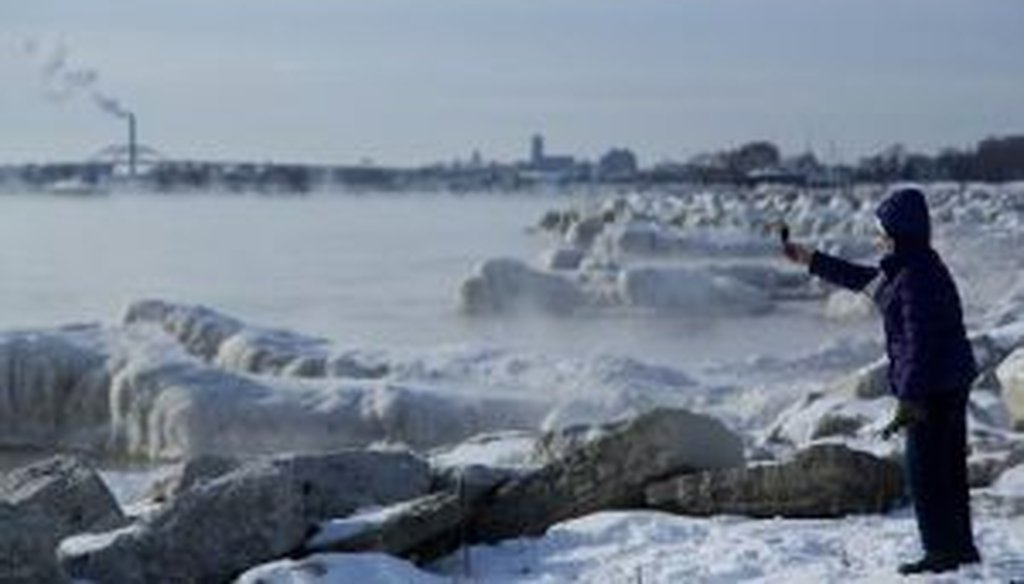Get PolitiFact in your inbox.

Someone takes a picture along the shore of Lake Michigan with temperatures in the negative digits on Jan. 7, 2014, in Milwaukee. A "polar vortex" of frigid air centered on the North Pole had dropped temperatures precipitously. (Getty Images)
It's colder in the U.S. than on Mars, Twitterverse says
The polar vortex takes no prisoners. At the start of 2014, the Midwest, East Coast and parts of Canada experienced brutally cold temperatures, some of them record-breaking. We’ve seen pitiable tweets from #ChiBeria and tales of people burning themselves in the name of cold-weather science. But what really caught our eye was the number of people comparing the climates of Earth and Mars.
There’s no shortage of claims on Twitter about different cities being colder than Mars: Minneapolis, Toronto, Chicago, you name it. Outlets like Yahoo and Smithsonian magazine also spread the information around with more nuanced reports.
PolitiFact is owned by the Tampa Bay Times, which is based in sunny St. Petersburg, Fla., so not everyone on staff is a cold-weather expert. So we touched base with scientists to see whether the United States and Canada really have been colder than Mars.
The answer is not cut and dried.
"While technically true, it’s a goofy comparison," said Ben Longmier, an aerospace engineering professor at the University of Michigan. "The temperatures on Mars fluctuate like they do on Earth."
We know that stepping outside in Chicago doesn’t feel the same as in Rio de Janeiro or Stockholm. Mars is no different.
The assertion that Earth is colder than Mars is based on temperatures from NASA’s robotic rover, Curiosity, which measured a maximum ground temperature of minus 33 degrees Fahrenheit at the time we wrote this story.
Featured Fact-check
That’s roughly on par with one of the coldest U.S. cities. Minneapolis saw minus 23 F, with a wind chill that made it feel like minus 48 F. Winnipeg, Canada, the reference point for Yahoo’s Geekquinox post, which other news sources and tweets referenced, experienced similar temperatures. So the "real feel" is colder in those cities than on Mars -- at least in one sense.
But not so fast. The air on Mars is much colder than its surface.
Curiosity reports that the air temperature from its location is between minus 193 and minus 76. And again, that’s just at one location on the planet. Samuel Kounaves, a chemistry professor at Tufts University who specializes in planetary sciences, said the average air temperature on Mars is about minus 50.
So the coldest places in the United States and Canada can edge out the warmest places on Mars, especially if we look at Mars ground temperature, not air temperature. But on average, there’s no question that Mars is colder. After all, Mars is tens of millions of miles further from the sun than Earth is.
That said, let’s not get too carried away in technicalities and lose sight of what really matters here.
"Either way, it's darn cold in Michigan right now!" Longmier said.
Our ruling
We’ve seen a lot of tweets about how it’s colder in the United States and Canada than it is on Mars, due to the frigid weather system known as the polar vortex. But that’s only correct if we cherry-pick the highest Mars temperatures. On average, our hypothetical Martian brethren are still way colder. We rate this claim Mostly False.
Our Sources
The Atlantic, "Right now, it’s as cold in Canada as where our Rover is on Mars," Jan. 2, 2014
BoingBoing, "Three reasons it’s not a good idea to directly compare the temperatures of different planets," Jan. 3, 2014
Center for Science Education, "Measures of the planets," accessed Jan. 7, 2014
Email interview with Ben Longmier, University of Michigan aerospace engineering professor, Jan. 6, 2014
Huffington Post, "Polar vortex brings dangerous cold temperatures to Midwest," Jan. 6, 2014
Phone interview with Nadine Barlow, Northern Arizona University physics professor, Jan. 7, 2014
Phone interview with Samuel Kounaves, Tufts University chemistry professor, Jan. 6, 2014
Rover Environmental Monitoring Station, "Mars weather," accessed Jan. 7, 2014
Smithsonian, "This cold snap is making it colder than the surface of Mars," Jan. 2, 2014
Yahoo! Geekquinox, "Frigid Winnipeg temperatures reach as cold as the planet Mars," Jan. 1, 2014
Browse the Truth-O-Meter
More by Julie Kliegman
It's colder in the U.S. than on Mars, Twitterverse says
Support independent fact-checking.
Become a member!
In a world of wild talk and fake news, help us stand up for the facts.





















































